

by Single Session Swiss
I had difficulty lining up partners for Mansfield. Ken Leopold, who did well in the NAP Flight B finals last year, agreed to play with me in the district finals of that events, and Jeanne Martin agreed to play with me on Friday. However, with less than a week remaining the first two days were still open. Fortunately, over the weekend I was delighted to learn from Sabrina Miles, the tournament chairperson and partnership coordinator, that she had arranged for Ru Terajewicz and Darryl Legassie to sit across from me.

My wife Sue wanted to keep her schedule flexible. So, I left Enfield by myself at 7:45 on Wednesday morning. I listened to Tchaikovsky's Cherevichki, which surely must be the most neglected great opera, throughout the drive. I arrived at the Holiday Inn just before 9:30 and met Ru shortly thereafter. She plays quite a sophisticated card, and we had quite a bit to discuss. I declined to play Mini-Roman, but we quickly came to agreement about just about everything else. I am delighted to report that we had almost no bidding misunderstandings, and we put to use a few of the more obscure items on the card.
Before the first session I picked up a copy of the printed “bulletin,” and I almost immediately noticed that I had made a mistake on the first day's schedule, which was on the back page. It listed an A/X pairs flight and a Mid-flight pairs, when in fact there was only an ABC pairs. This was the very event in which Ru and I played.
The competition in the ABC pairs on Wednesday was very tough. It seemed as if we were playing nothing but A teams, but we managed to score slightly above average in the morning. I also learned something from Ru. I already understood that a two-level bid in the fourth seat showed 12-14 with six pieces. Therefore, the 1♠-1NT-2♠ sequence must show something different — 15-17 with six pieces. 1♠-1NT-3♠, which is the sequence that she used, is therefore available for a 15-17 hcp hand with seven pieces. We missed a game because I did not understand this.
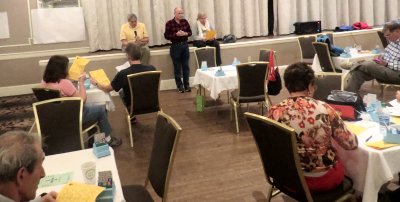
I was shocked to see that the hotel's lunch special — sandwich, chips, and a drink — cost $11.50 this year. I am sure that it was much less last year. Fortunately, Sue brought a lot of food, and so I was only gouged this once.
I attended the panel discussion of the morning's hands, which featured Kate McCallum, Bob Bertoni, and Dick Budd. Kate said that she had researched several thousand hands, and she felt quite certain that the real “right number” for a fourth-seat opener was thirteen Pearson points (high card points plus number of spades), not fifteen. I had never heard anyone say anything like this before.
For the second regional in a row, I was struck by extreme fatigue about halfway through the afternoon session. The fact that I consistently drew bad cards did not help. We still did all right except for the three hands that we allowed Zach Grossack to declare. My brain at that point was a complete fog. I don't remember the details, but they were ugly. I may have made mistakes without realizing it. Our score in the second sessions was in the forties, but I had a good time.
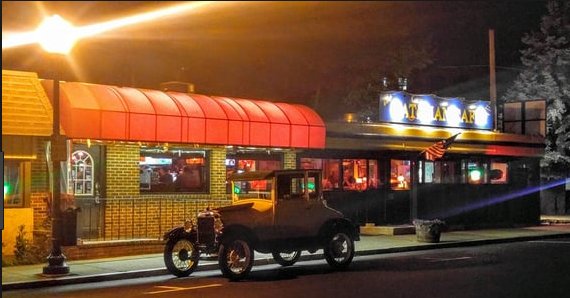
Sue and I got tasty hamburgers at the Longhorn Steak House. Because Sue wanted to play in the evening game, we requested speedy service, and they definitely delivered. Afterwards I fell asleep in the hotel room while watching Northern Illinois against Toledo.
Even though our room was adjacent to the pool area, I got a very good night's sleep. In the morning Sue wanted to go to the Catman Cafe, a dive in downtown Mansfield, for breakfast. Unbeknownst to me, she had gone there on some previous occasion. When we arrived the place was completely dark. I learned later that they only served breakfast on weekends. This may have been a blessing in disguise; the place was pretty seedy looking. Instead we ate at the nearby Looking Glass Cafe. The food there was better than we remembered it, but I do not understand how this place stays in business. Only a handful of people were there, and some of them were just drinking refills of their coffees.
The card that Darryl and I came up with was much simpler than the one that I played with Ru. We once again played in the Open Pairs, but the level of the competition did not seem quite as fierce. Many of the best players were in the Monster Knockout. Darryl and I managed a respectable 56% in the morning session.
I treated myself to a chicken sandwich in our room at lunch. It was accompanied by potato chips and Diet Coke that I had purchased at Shaw's after supper on Wednesday.
I also brought a large glass of Diet Coke to the playing area to keep me awake during the second session. It worked! Darryl and I scored over 61% in the afternoon, which was good enough to win the overalls in the B strat.
We only really had two problems all day. On a hand in the morning Darryl threw in an overcall in clubs while the opponents were bidding spades. A firm believer in the “support with support” maxim, I raised with three rags. The opponents got the bid at 3♠. Darryl led a club, which gave them an overtrick. He remarked that he wished that I had not raised with such a weak suit, because it got him off to a bad lead.
He had a point, especially since my bid did not really interfere with their bidding. The thing is that there is a fairly easy solution to this problem, the Rosenkranz double, which is a raise to overcaller's suit that promises a high honor. The simple raise actually denies the top honor. Ru and I had been playing this convention on Wednesday, and we even used it once or twice.
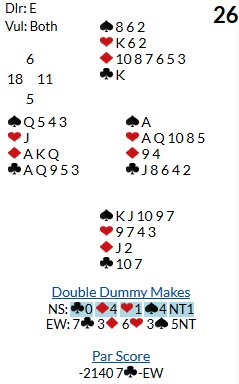
When I am playing with partners who do not know this convention (most of them), I am very careful about leading a broken suit that I have overcalled. I always try to calculate what percentage of the remaining cards my partner has. If I have six, and my partner raised, that still leaves four for the opponents. The odds of my partner having a specific card are less than 50%. The odds of him/her having one of two missing cards are 1-(4/7 x ½), or 71.4%. So, leading from KJ is fairly safe.
The other hand was #26 in the afternoon. I sat in the West chair. Darryl opened 1♥. I decided to bid 1♠ and put the game force in later. Darryl bid his club suit, and I bid 2♦. I was prepared for any bid except for the rebid of clubs, which is what he did. I made the mistake of bidding 3♦, an ambiguous bid. Darryl bid 3NT. I bid 4♣, which I hoped was forcing, but Darryl passed.
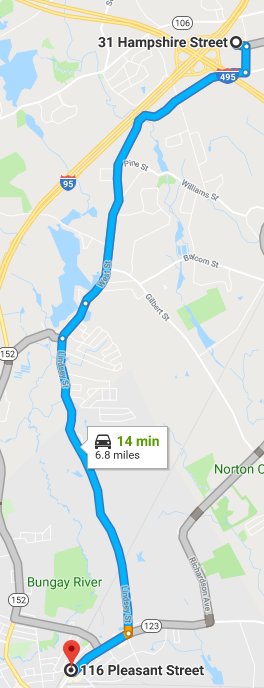
Where did I go wrong? With this hand, bidding 2♣ immediately is clearly preferable. Darryl can confirm clubs, and we can start bidding controls. However, it seems to me that I should have been able to guide us to a good contract starting with the spade response. Maybe I should have just bid 4NT after Darryl's second club bid, but I was really afraid of those low spades if his answer took us past 5♣.
It would have helped if we had been playing Redwood or Kickback. In both of those conventions after the 3♣ call 4♦ is used for Blackwood.
After Sue took our photo, I meandered over to the Partnership Desk, where I discovered that Mike Heider and Jim Osofsky were looking for teammates for the Open Swiss on Friday. I called Mike and arranged for Jeanne and me to team up with them.
I used Google Maps on my phone to fine KFC in Attleboro. It directed me to just get on West Street and drive at 30 mph a lot farther than I expected.
Sue once again played in the Super Points game while I ate my extra crispy and watched North Carolina State beat up on Wake Forest. I was already asleep when the Demon Deacons came back in the second half to record the upset.
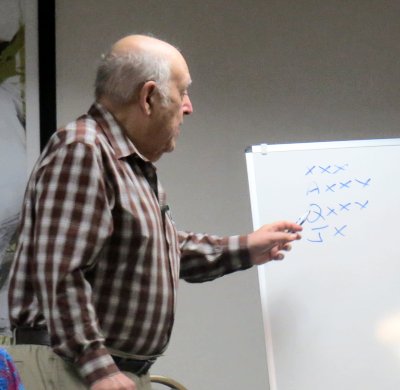
On Friday morning I dropped in to the 299er room to listen to Harold Feldheim's talk on Swiss team strategy. I think that he did an exceptional job of outlining the basic differences between matchpoints and IMP's and the consequent effect on strategy.
It was not easy to locate Mike and Jim in the crowd on Friday morning. I could not locate Jeanne at all. I checked my phone messages; there was a very disturbing one from her that indicated that her GPS was evidently broken, and she had been driving around in circles. She said that I should find another partner, which was not likely at that point. I called her back, and she said that she now thought that she could make it on time. I told her where our first table was located, and, sure enough, she arrived at 9:59, out of breath but happy to start playing.
There was an odd number of teams, and so we found ourselves in the first three-way. We won one match easily, but we were defeated by a similar margin in the second match. The rest of the day was mostly uneventful. We won or lost one close match after another. There were very few swings of any note. Fortunately, we got an easy draw in the last round, and we snuck into a tie for fourth place in B when Jeanne bid a cold slam, and our counterparts at the other table failed to find it.
Sue and I drove in the rain to Bertucci's for supper. I had the worst seat in the house (in the bar in front of the opening to the kitchen and takeout area), and I was not in a good mood. I needed to learn the Woolsey Notrump Defense, and the documentation that I had printed made no sense. On Saturday I would be playing in the NAP's, and I desperately wanted to do well. I hardly even tasted the pizza as I tried to make sense of the paper in front of me.
By the way, the Ultimate Bertucci was very good. Sue and I particularly enjoyed the meatball slices.
After supper I watched a pitiful Louisville team get mauled by Syracuse in the second quarter. I then tossed and turned for most of the night. I fixed myself a scotch, but it did not help much. The noise from the pool area did not help. I brought earplugs, but I did not expend the effort to fish them out of the suitcase.

The Communications Committee met on Saturday morning. We spent most of our time talking about the tribute to the late Allan Clamage that will take place at the Presidential Regional in Cromwell, CT. The setting should be perfect. Allan was president of both the New England Bridge Conference and the Connecticut Bridge Association. I plan to use the occasion to try to boost attendance on the last day of the event, which is always President's Day. We also decided to continue the use of legal-sized paper for the printed bulletin.
Saturday was one of the worst days of my bridge-playing life. It began well enough. Bob Sagor explained the aspects of Woolsey that had baffled me, and he assured me that we were making a good decision to begin using it.
The field in Flight B of the NAP was very strong. There was no margin for error. Even though Ken and I had played weekly for several years, and we do not play a sophisticated card, we still managed to have several costly bidding misunderstandings. I also made a defensive error just because I was too lazy and impatient to think it through. In the end, we missed qualifying for the second day by a very small margin.

This left me in a very foul mood during the Executive Committee meeting. The highlight was the explanation of a new system of vouchers similar to the Bridge Bucks used by the ACBL. They can be purchased using a credit card. The system will begin in 2019, at the Cromwell tournament if the details can be arranged by then.
After the meeting I learned from Sue that Ken had decided that he did not want to play on Sunday in one of the other events. So, my options on Sunday were to try to find another partner or to go home after the meeting of the Board of Delegates. I chose the latter.
I may have slept an hour or two on Saturday night. I kept thinking about Saturday's hands. I may have too many points to play in Flight B next year, and I have never done well in the NAP. I knew that it would be difficult to qualify this year, but I certainly expected to be playing on Sunday.
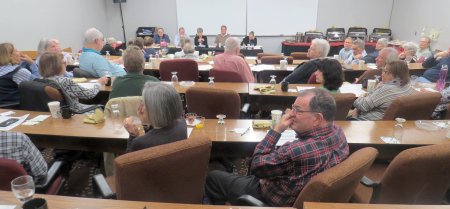
At the BoD meeting the delegates seemed to be quite appreciative of the plan for vouchers and shocked at the monetary losses for the last two Senior Regionals in North Falmouth. For me the most interesting part of the meeting was Rich DeMartino's strongly expressed opinion that the Senior Regional could be held elsewhere without violating ACBL regulations. I plan to look into this.
I enjoyed hearing the rest of Cherevichki on the way home. I remained in a very bad mood, but wallowing in self-pity did not prevent me from appreciating the genius who produced those melodies.
No tournament trip is ever over until I have located and greeted both of our indoor-outdoor cats. I was surprised to discover that my long-time buddy Giacomo had suffered a wound on his right forelimb in our absence. He was obviously in some pain; he whimpered softly as I applied some Bacitracin to it. I am happy to report that his boo-boo seems to be all better now.
